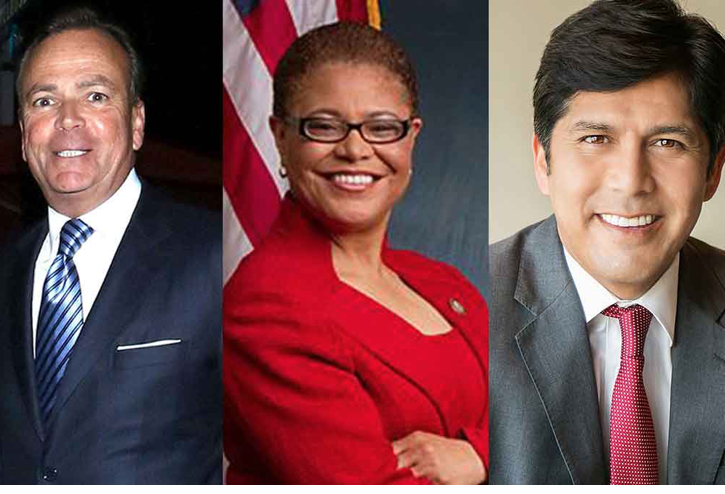CommentsLA MAYORAL RACE - Why does Los Angeles trust Sacramento and Washington more than it trusts itself?
Angelenos may complain about state and national government like other Californians, but we also have a practice of using Sacramento and D.C. as training grounds for our local politicians. Only after they’ve proven themselves in the state legislature or Congress (or really, anywhere but here) do we feel comfortable elevating them to higher office.
The habit is holding this year, as Los Angeles chooses a new mayor and fills other top elected jobs amidst a continuing pandemic emergency and homeless crisis.
In the city of Los Angeles, for months, polls have shown former Assembly Speaker Karen Bass, now a member of Congress, leading or tied for the leader of the mayor’s race. City Councilman Kevin De León, who is better known for his four-year leadership of the state Senate during his 12 years in Sacramento, has been a strong contender, though recent polling suggests he is struggling to add support. Trailing them is former Assemblyman Mike Feuer, now city attorney, whose policy-focused campaign makes him an intriguing dark horse.
As for L.A. County, former Assembly Speaker and current State Senator Bob Hertzberg and State Senator Henry Stern are both seeking a seat on a board of supervisors that now includes Sheila Kuehl and Holly Mitchell (both former members of the Assembly and state Senate), Janice Hahn (a former member of Congress), and Hilda Solis (who served in the state legislature, Congress, and the Obama cabinet).
Of course, transitions from state to local office happen in other California places, in large part because of the games of political musical chairs term limits produce. Assembly Speaker Willie Brown became Da Mayor in San Francisco, and former State Senate President Pro Tem Darrell Steinberg is chief executive of the city of Sacramento.
But most of the time, California’s ambitious pols work their way up from the local to state level, as in Gavin Newsom’s rise from the San Francisco Board of Supervisors to mayor to statewide office. Indeed, the last four San Francisco mayors came to the job from other local offices.
What makes Los Angeles different?
The answer to that question lies in our peculiar mix of ego and insecurity.
We see ourselves as a city of stars, drawn from across the universe to L.A.’s sunshine and spotlight. We see excellence as an import, and so we honor foreign film directors at the Oscars and celebrate the Lakers picking up LeBron or the Dodgers signing a free-agent first baseman..
This dynamic can be maddening for locals. It’s why, in the film La La Land, Ryan Gosling’s character, an underappreciated jazz musician, complains of his fellow Angelenos, “They worship everything, and they value nothing.”
The even darker side of this devotion to global stars is that it reveals a profound insecurity about ourselves. Los Angeles locals don’t trust our ability to produce greatness in our local communities.
Unfortunately, self-pessimism makes a certain sense, when you consider the poor quality of our schools and our lack of economic mobility. Given the high cost of living, this is no longer the place to come to make your fortune; moving to L.A., and to much of California, has become a luxury, possible mostly for those who have already made it elsewhere.
L.A.’s weak political scene doesn’t inspire confidence either. It’s true that the departing mayor, Eric Garcetti, came up through the city council (though he built his image on elite educational credentials acquired elsewhere, like his Rhodes scholarship). But today he is so unpopular that he’s trying to leave office early (to become ambassador to India). The most local of the mayoral candidates, councilman and former LAPD cop Joe Buscaino, is a heavy underdog. (Angelenos seem to have forgotten that L.A.’s late, great mayor Tom Bradley was also a cop-turned-councilman.)
In this year’s race, Bass seems to be the favorite in part because of the status she gained elsewhere—as a consensus-building Assembly speaker in Sacramento, and as a member of Congress influential enough to make President Biden’s short list for vice president. De León’s case for leadership is similarly grounded not in his recent work on the city council, but in historic labor, environmental, and pro-immigrant legislation he got passed in Sacramento.
But does this Angeleno bias for electing state legislative leaders (Antonio Villaraigosa was also Assembly speaker before becoming mayor) still make sense? Because, right now, L.A.’s biggest public need isn’t for legislative dealmakers but for excellent public administrators, who can re-engineer outdated departments and make faltering homelessness programs work better.
Unfortunately, the L.A. mayor’s race doesn’t seem to have such an administrator. The developer Rick Caruso, who has a high-profiled and self-funded campaign that has been gaining in the polls, is pitching himself as a managerial expert who can clean things up. But the reality is that developers are mostly promoters and dealmakers rather than tough administrators. And so for all Caruso’s savvy, his skill set is closer to that of his ex-legislator opponents than his ubiquitous ads might lead you to believe.
Caruso is making gains by talking about crime as an issue. But does his experience fit L.A.? His personal pitch to voters centers around his success in creating popular Southern California shopping-and-entertainment developments, like the Grove, next to the Original Farmers Market, and the Americana, in Glendale. That may prove to be a mistake, since such local successes seem unlikely to impress Angelenos.
After all, what has he ever done in Sacramento and Washington?
(Joe Mathews writes the Connecting California column for Zócalo Public Square where this article was published.)
















